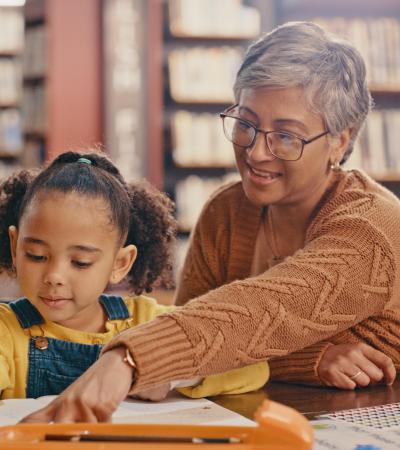The town of Circle, Montana has a population of about 600 people. It is an isolated place, a place where the nearest Walmart is over 100 miles away. This being the case, Circle residents often depend on their local library as a place to find resources, build connections and strengthen relationships.

Mary James is the library director at George McCone Memorial County Library, which serves the small town of Circle. And even though James does not work in a full-time capacity, she is the only person the library has hired to work more than 10 hours a week and often finds herself working alone, especially on the weekends. James told us about how the isolation of Circle impacts its residents, and what the library — with the help of ALA’s Libraries Transforming Communities: Focus on Small and Rural Libraries grant — has done to counter it.
Circle, Montana, according to James, has a “profound need” for its library, which often focuses on serving the town’s aging population. The younger folks, which she refers to as Circle’s “missing generation,” had been leaving the town for decades, following a series of droughts that left the farming community struggling to recover. Recently, younger people have started to return, and, using funds from the LTC grant, James has helped breathe life back into Circle for its younger and aging residents.
The library brings back the music
The first step to bringing life back to this small town is to get the community excited about something everyone can learn to love: music.
The local music teacher serving grades K-12 recently retired and James saw a need for music education to keep Circle residents engaged in something positive and productive. Although the school had tried hiring a new music teacher to replace the one who retired, most applicants eventually turned down the job offer, claiming that the town was too isolated. And while James certainly recognizes that isolation is a problem for Circle, she believes in the library’s ability to begin to fix it. But in Circle, “there’s not a lot of money.” She would have to be creative.
To begin, the George McCone Memorial County Library hosted a community conversation focused on what the town could do to support the school’s ailing music department. Only 10 people attended, but that was enough because the conversation yielded several crucial ideas, one of which was a micro-lending program for music lessons and sheet music. The lessons would be short, offered as single lessons or pairs of lessons for community members who didn’t have time, money or other commitments. Folks could simply sign up for a lesson or two and begin to connect with others taking music lessons, using sheet music borrowed from other town members. The micro-lessons were a success, but James still has other ideas about how she can use the LTC funds to advance the library’s and the town’s music initiatives.
Music as a community connector
One idea she has is to revive the town musical, which Circle used to host but which fell by the wayside due to a lack of resources and participation. James also wants to create a non-denominational choir for interested community members. She thinks the choir would be especially important during the holidays when isolation and cooling temperatures force people to stay home alone. A choir, James believes, would get them out or, perhaps even better, bring a group of singers to isolated residents’ doorsteps, filling the town with holiday cheer.
The last idea, James sees as a “big ask,” involves raising money to fix up the town’s crumbling homes, with the goal of offering them to the new music teacher hires. Doing so, she thinks, will incentivize more qualified and motivated candidates to come to Circle, and stay there.
James told us that libraries like hers often have different and multiple needs, perhaps more so than better connected, urban libraries. Oftentimes, towns like Circle are so isolated and have so few resources, that community members look to the library to address a broader range of needs. Put another way, residents don’t just go there for books or information, but for many other fundamental services. The small amount of money that George McCone has in its budget simply isn’t enough to meet all expectations. But with the help of LTC funding, Mary James and George McCone Memorial County Library are taking steps in the right direction, providing residents with a space where they can come together, share stories, swap resources, and make vital connections in a time where isolation is a constant battle.
Small and rural libraries: surviving isolation through connection
Other libraries agree with James’ thoughts on small and rural libraries and the challenges they face being isolated from urban centers. Many library workers who received LTC funding noted how the money they received has helped them combat isolation in their towns. Here are just a few examples of what they had to say:
- “We brought people together during this isolating year. We updated them on important community projects (broadband, water quality, walkability, wastewater), and uplifted them with important books about social connection.” - Greensboro (Vt.) Free Library
- “[In LTC book conversations,] members get the opportunity to see themselves and others through the characters in the books which has been a gift as we move through the changes and isolation brought on by COVID-19.” - Mineral Point (Wis.) School Libraries
- “When so many were isolated at home — and very isolated since we are quite rural — the library became an even more important facilitator of connection.” - Roeliff Jansen Community Library (N.Y.)
- “I think the people who participated in the [LTC] project were happy to connect with others (even via Zoom) after a difficult Spring of isolation. Everyone who I talked to about the book conversations and the community picnics loved the concept…” - Casco (Maine) Public Library
- “Covid also caused times of isolation and confinement and librarians were found to be the link to supplying material for entertainment and the escape from a frightening real world.” - Valentine (Neb.) Public Library
- “The [LTC] community conversations gave participants a chance to voice what they need in these uncertain times and induced a feeling of camaraderie with their neighbors. Being heard is always gratifying, but having an opportunity to express concerns and thoughts following a period of isolation was therapeutic and empowering for many of our participants.” - Patterson (N.Y.) Library
Knology is a nonprofit research organization that produces practical social science for a better world. The organization pursues this goal to help professionals in a variety of sectors build inclusive, informed, and cooperative societies that can thrive together with the natural systems on which we all depend. As a transdisciplinary collective of over 30 social scientists, writers and educators, the organization's work process is built on equity, transparency and deliberation.



